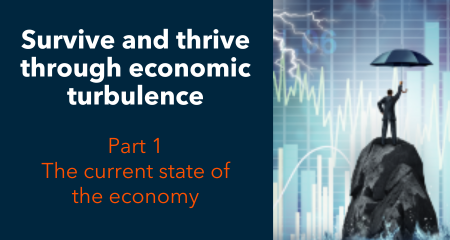Note: This is part one of a three-part blog series about positioning your consumer reporting agency (CRA) or background screening company to survive and thrive through the current economic turbulence and the turbulence sure to come. Today we’ll look at the current state of the economy and what to expect for the rest of the year and in 2024.
We’ll provide expert tips for navigating the economic storm in parts two and three. Watch our recent webinar for a sneak peek.
We’ve all felt the sting of inflation over the past year in our businesses and personal lives. We’ve read about layoffs at the big tech companies and followed the recent bank failures. We’ve all heard the predictions that a recession is, if not imminent, possible.
None of this is what keeps InformData COO Bill Wilder up at night. It’s not the “R” word. It’s the “U” word: uncertainty.
In a recent webinar, Wilder acknowledged that numerous economic indicators point to a continued downturn. But there’s one number of paramount interest to CRAs making a case for optimism.
“There's something materially different happening right now that is very impactful to our industry, and that is where unemployment and, more importantly, where the quit rate is in America,” Wilder observed.
(You can think of the quit rate as how confident people are about leaving their jobs.)
The U.S. Bureau of Labor Statistics pegs the current nationwide quit rate at a stunning 2.6%. And it doesn’t seem like the rate will decline anytime soon. According to a LinkedIn report, 61% of U.S. workers are considering leaving their jobs in 2023, including nearly 70% of Gen Zers and millennials.
For CRAs, lots of quitting means lots of hiring — which means high demand for pre-employment background screening. All of this leads to a conflicting economic outlook.
“We're talking about an environment right now where there's one camp that's telling you that the world's coming to an end, and then there's this other camp that's saying, ‘No. The volumes in this industry are going to explode,’” Wilder said.
What Are the Major Players Saying?
Smart CRAs prepare for multiple economic scenarios. Here at InformData, for example, we have a plan for everything from a 15% volume reduction to a 20% spike.
But we can get a sense of where the industry might be headed by looking at what the big names in background screening are saying. Three publicly traded CRAs have held investor calls in the past few weeks where they discussed their 2022 Q4 numbers and offered revenue guidance for 2023.
For the most part, revenue guidance from the largest CRAs predicts negative to single-digit growth:
- First Advantage predicts - 5% through 0% growth this year.
- Sterling expects - 1% through 4% growth.
- HireRight forecasts - 4% through 11% growth.
This doesn’t mean your CRA will see similar growth. Much can happen between now and the end of 2023, including acquisitions and changes in market conditions. But you can use these numbers as a starting point; generally, the industry’s largest CRAs do not anticipate exceptional revenue growth in 2023 and would not be surprised by moderate negative growth.
(As for what everyone else in the background screening industry predicts for 2023, according to a poll conducted during our recent webinar, 37% of CRAs expect to grow equal to or better than previous years, 42% expect less growth, and 21% predict zero growth. Clearly, there’s no definitive answer.)
Open Questions for the Background Screening Industry in 2023
At least two unsettled questions are contributing to the current climate of economic uncertainty:
Are We Experiencing a ‘Rolling Recession’?
According to some economic observers, the country is either in the middle of or headed toward a “rolling recession.” A rolling recession is an economic downturn affecting certain sectors while leaving others untouched.
This may explain why the economic outlook appears challenging from certain perspectives (for large tech companies, for example) and robust from other points of view (such as unemployment).
Whether or not the country is in a rolling recession, the takeaway for CRAs is that your experience of 2023 could be very different from other CRAs, depending on the sectors you serve. This leads us to the second open question:
How Much Will the End Users’ Environment Matter?
While your CRA is preparing for a potentially tumultuous two years, your end-users are attempting to do the same. This may have implications for your business.
For example, some end-users may cut back on background screening as part of expense reduction efforts in response to high inflation and a possible recession. Regulatory issues may come into play, as well. A number of states have passed or are considering bills related to background screening and privacy.
An Uncertain Economy Calls for Financial Discipline
The coming years may be stormy, but CRA veterans have weathered storms before: first in the 2008 Great Recession and then again during the COVID pandemic. Then, as now, surviving and thriving required a solid foundation of financial discipline.
InformData Chief Revenue Officer Marco Piovesan led a CRA through the COVID years. Success, he said during the webinar, came down to a few fundamental principles which CRAs can apply to the current climate:
- Cash is king. “Make sure you’ve got payrolls for several months,” Piovesan said.
- Forecast revenue conservatively. Conservative revenue forecasts tend to have a “trickle-down” effect on expense management and margins, Piovesan pointed out.
- Be smart about expenses. “Just be disciplined,” Piovesan counseled.
- Don’t give up on your strategic priorities.
- “If you've got some strategic initiatives that you've been working on either to help you get through the recession or to come out of the recession in a stronger position, continue with those strategic priorities,” Piovesan said.
Looking Ahead: How to Prepare for Turbulence
An uncertain economic forecast is a challenge but can also be an opportunity. In the next two installments of this series, we’ll explore how CRAs can make the most of turbulent times by optimizing operations, innovating new ways to serve end-users better, and focusing on revenue and client relations.
Check back soon for updates (or subscribe here).



